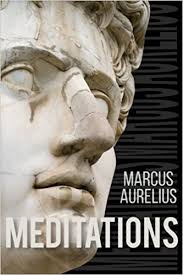Meditations Page #4
Meditations is a series of personal writings by Marcus Aurelius, Roman Emperor from 161 to 180 AD, recording his private notes to himself and ideas on Stoic philosophy. Marcus Aurelius wrote the 12 books of the Meditations in Koine Greek as a source for his own guidance and self-improvement.
One so gentle towards a foe was sure to be a good friend; and indeed his pages are full of generous gratitude to those who had served him. In his First Book he sets down to account all the debts due to his kinsfolk and teachers. To his grandfather he owed his own gentle spirit, to his father shamefastness and courage; he learnt of his mother to be religious and bountiful and single-minded. Rusticus did not work in vain, if he showed his pupil that his life needed amending. Apollonius taught him simplicity, reasonableness, gratitude, a love of true liberty. So the list runs on; every one he had dealings with seems to have given him something good, a sure proof of the goodness of his nature, which thought no evil. If his was that honest and true heart which is the Christian ideal, this is the more wonderful in that he lacked the faith which makes Christians strong. He could say, it is true, 'either there is a God, and then all is well; or if all things go by chance and fortune, yet mayest thou use thine own providence in those things that concern thee properly; and then art thou well.' Or again, 'We must needs grant that there is a nature that doth govern the universe.' But his own part in the scheme of things is so small, that he does not hope for any personal happiness beyond what a serene soul may win in this mortal life. 'O my soul, the time I trust will be, when thou shalt be good, simple, more open and visible, than that body by which it is enclosed;' but this is said of the calm contentment with human lot which he hopes to attain, not of a time when the trammels of the body shall be cast off. For the rest, the world and its fame and wealth, 'all is vanity.' The gods may perhaps have a particular care for him, but their especial care is for the universe at large: thus much should suffice. His gods are better than the Stoic gods, who sit aloof from all human things, untroubled and uncaring, but his personal hope is hardly stronger. On this point he says little, though there are many allusions to death as the natural end; doubtless he expected his soul one day to be absorbed into the universal soul, since nothing comes out of nothing, and nothing can be annihilated. His mood is one of strenuous weariness; he does his duty as a good soldier, waiting for the sound of the trumpet which shall sound the retreat; he has not that cheerful confidence which led Socrates through a life no less noble, to a death which was to bring him into the company of gods he had worshipped and men whom he had revered. But although Marcus Aurelius may have held intellectually that his soul was destined to be absorbed, and to lose consciousness of itself, there were times when he felt, as all who hold it must sometimes feel, how unsatisfying is such a creed. Then he gropes blindly after something less empty and vain. 'Thou hast taken ship,' he says, 'thou hast sailed, thou art come to land, go out, if to another life, there also shalt thou find gods, who are everywhere.' There is more in this than the assumption of a rival theory for argument's sake. If worldly things 'be but as a dream, the thought is not far off that there may be an awakening to what is real. When he speaks of death as a necessary change, and points out that nothing useful and profitable can be brought about without change, did he perhaps think of the change in a corn of wheat, which is not quickened except it die? Nature's marvellous power of recreating out of Corruption is surely not confined to bodily things. Many of his thoughts sound like far-off echoes of St. Paul; and it is strange indeed that this most Christian of emperors has nothing good to say of the Christians. To him they are only sectaries 'violently and passionately set upon opposition. Profound as philosophy these Meditations certainly are not; but Marcus Aurelius was too sincere not to see the essence of such things as came within his experience. Ancient religions were for the most part concerned with outward things. Do the necessary rites, and you propitiate the gods; and these rites were often trivial, sometimes violated right feeling or even morality. Even when the gods stood on the side of righteousness, they were concerned with the act more than with the intent. But Marcus Aurelius knows that what the heart is full of, the man will do. 'Such as thy thoughts and ordinary cogitations are,' he says, 'such will thy mind be in time.' And every page of the book shows us that he knew thought was sure to issue in act. He drills his soul, as it were, in right principles, that when the time comes, it may be guided by them. To wait until the emergency is to be too late. He sees also the true essence of happiness. 'If happiness did consist in pleasure, how came notorious robbers, impure abominable livers, parricides, and tyrants, in so large a measure to have their part of pleasures?' He who had all the world's pleasures at command can write thus 'A happy lot and portion is, good inclinations of the soul, good desires, good actions.'
Translation
Translate and read this book in other languages:
Select another language:
- - Select -
- 简体中文 (Chinese - Simplified)
- 繁體中文 (Chinese - Traditional)
- Español (Spanish)
- Esperanto (Esperanto)
- 日本語 (Japanese)
- Português (Portuguese)
- Deutsch (German)
- العربية (Arabic)
- Français (French)
- Русский (Russian)
- ಕನ್ನಡ (Kannada)
- 한국어 (Korean)
- עברית (Hebrew)
- Gaeilge (Irish)
- Українська (Ukrainian)
- اردو (Urdu)
- Magyar (Hungarian)
- मानक हिन्दी (Hindi)
- Indonesia (Indonesian)
- Italiano (Italian)
- தமிழ் (Tamil)
- Türkçe (Turkish)
- తెలుగు (Telugu)
- ภาษาไทย (Thai)
- Tiếng Việt (Vietnamese)
- Čeština (Czech)
- Polski (Polish)
- Bahasa Indonesia (Indonesian)
- Românește (Romanian)
- Nederlands (Dutch)
- Ελληνικά (Greek)
- Latinum (Latin)
- Svenska (Swedish)
- Dansk (Danish)
- Suomi (Finnish)
- فارسی (Persian)
- ייִדיש (Yiddish)
- հայերեն (Armenian)
- Norsk (Norwegian)
- English (English)
Citation
Use the citation below to add this book to your bibliography:
Style:MLAChicagoAPA
"Meditations Books." Literature.com. STANDS4 LLC, 2025. Web. 23 Feb. 2025. <https://www.literature.com/book/meditations_76>.








Discuss this Meditations book with the community:
Report Comment
We're doing our best to make sure our content is useful, accurate and safe.
If by any chance you spot an inappropriate comment while navigating through our website please use this form to let us know, and we'll take care of it shortly.
Attachment
You need to be logged in to favorite.
Log In